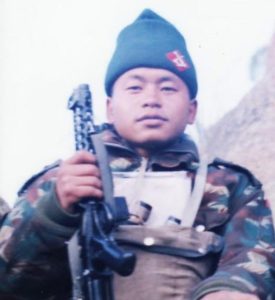 Ahead of the Late Captain’s 25th death anniversary, Joziah Ryan K Lyngdoh pays a visit to the martyr’s residence, partly turned museum and accounts for his immortal spirit of bravery and valour.
Ahead of the Late Captain’s 25th death anniversary, Joziah Ryan K Lyngdoh pays a visit to the martyr’s residence, partly turned museum and accounts for his immortal spirit of bravery and valour.
As we near the 25th death anniversary of a martyr, a hero, and life of bravery, none other than Late Captain Keishing Clifford Nongrum. The Late Captain, an Officer at the Indian Army was posthumously honoured the Maha Vir Chakra for his exceptional bravery. In remembrance of Captain, with immense gratitude and respect to his family and well-wishers, Sunday Shillong brings to its readers some insights and lesser-known facts about the Late Captain.
 Born on the 7th of March 1975, Captain Keishing Clifford Nongrum was raised by Peter Keishing and Mother Saily Nongrum, alongside two siblings, Geoferry Keishing Nongrum (older) and Paul Keishing Nongrum (younger).
Born on the 7th of March 1975, Captain Keishing Clifford Nongrum was raised by Peter Keishing and Mother Saily Nongrum, alongside two siblings, Geoferry Keishing Nongrum (older) and Paul Keishing Nongrum (younger).
Described as intelligent, enthusiastic, and beloved by all, Captain Clifford Keishing Nongrum’s father, Peter Keishing, recalls how as a child, he was always curious and eager to explore the world around him.
 During his academic years, the Late Captain, along with his two siblings, attended Holy Child School from Nursery to 4th grade. Subsequently, they were transferred to Providence High School for 5th and 6th grade. Finally, they relocated once more to Don Bosco Technical School, where they successfully completed their education and received vocational training. It was during this period that Clifford accomplished his Motor Mechanics training. Later, they graduated from St Anthony’s College.
During his academic years, the Late Captain, along with his two siblings, attended Holy Child School from Nursery to 4th grade. Subsequently, they were transferred to Providence High School for 5th and 6th grade. Finally, they relocated once more to Don Bosco Technical School, where they successfully completed their education and received vocational training. It was during this period that Clifford accomplished his Motor Mechanics training. Later, they graduated from St Anthony’s College.
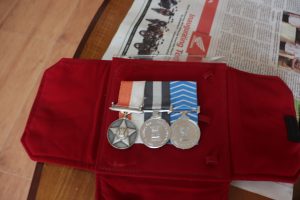 Interacting with the Late Captain’s brother, Geoferry Nongrum, he mentioned that Clifford established a football club named (Kiewshaphrang) for underprivileged children who couldn’t attend school due to their early engagement in working as labourers. The purpose of the club was to provide entertainment for these children. Instead of seeking donations for the club’s funds, he started a home bakery where young individuals came together to bake and cook, selling the products to generate revenue.
Interacting with the Late Captain’s brother, Geoferry Nongrum, he mentioned that Clifford established a football club named (Kiewshaphrang) for underprivileged children who couldn’t attend school due to their early engagement in working as labourers. The purpose of the club was to provide entertainment for these children. Instead of seeking donations for the club’s funds, he started a home bakery where young individuals came together to bake and cook, selling the products to generate revenue.
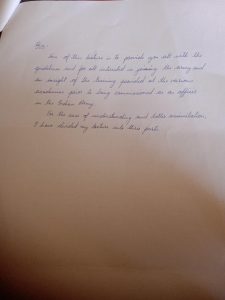 Prior to joining the army, Clifford displayed humility and kindness towards those in his vicinity.
Prior to joining the army, Clifford displayed humility and kindness towards those in his vicinity.
Additionally, he pursued a Motor Mechanic course and sought employment in the automotive industry to gain practical knowledge.
Notably, he exhibited a willingness to undertake any job that came his way without hesitation.
Paul, Clifford’s younger brother, enjoyed playing together during their childhood. While growing up, Clifford developed a particular interest in crafting wooden guns that resembled real ones, and eventually a passion for the military. At a very young age, Clifford’s desire to join the army was evident. Additionally, he found joy in going for jogs at the Gurkha Regiment.
 Paul reminisced about the times when he sought assistance with his studies, always turning to Clifford for clarification. Occasionally, he would be reprimanded by Clifford, who would say, “You can check the dictionary yourself.” Nevertheless, Clifford’s proficiency in English was undeniable.
Paul reminisced about the times when he sought assistance with his studies, always turning to Clifford for clarification. Occasionally, he would be reprimanded by Clifford, who would say, “You can check the dictionary yourself.” Nevertheless, Clifford’s proficiency in English was undeniable.Military Service
Clifford took the Combined Defence Services Examination (CDS) for the army without informing his family. After successfully passing the exam, he went for an interview in Bangalore (now Bengaluru). At that time, his 3rd year results had not been announced yet, but fortunately, it was out when he arrived there. Without wasting any time, the brothers promptly faxed the results to Bangalore. As soon as he completed college, he joined the army, where he was commissioned in 1995 and joined in 1996.
 Prior to enlisting in the military, he underwent a rigorous physical test for which he had been preparing for years since his college days. Following his graduation, he continued to train diligently, including swimming at Crinoline, all in pursuit of his goal to join the Army.
Prior to enlisting in the military, he underwent a rigorous physical test for which he had been preparing for years since his college days. Following his graduation, he continued to train diligently, including swimming at Crinoline, all in pursuit of his goal to join the Army.
Out of the 20-30 individuals in his group who were summoned for the physical test after the written examination, the grueling 2-weeks evaluation period saw many eliminated. Despite the challenges, he persevered and emerged as the sole survivor from his batch, ultimately succeeding in his quest to join the Army.
 Geoferry mentioned that “Clifford was assigned to the Siachen Glaciers, which is known as the highest battlefield in the world. In December 1998, he was posted there for the first time during winter, when temperatures dropped to -60°C. While Clifford was at the camp, his troops were spread out in various locations for patrolling and camping.
Geoferry mentioned that “Clifford was assigned to the Siachen Glaciers, which is known as the highest battlefield in the world. In December 1998, he was posted there for the first time during winter, when temperatures dropped to -60°C. While Clifford was at the camp, his troops were spread out in various locations for patrolling and camping.
Unfortunately, an Avalanche occurred in one of the areas where the troops were stationed, covering them completely. When Clifford realised there was no response from them, he took it upon himself to locate and rescue them. He bravely dug through the snow and managed to save approximately 12 troops.”
 Clifford, upon joining Kashmir during his holiday, mentioned that he had received training in Chennai. Subsequently, they were assigned to different regiments, and Clifford found himself in the Jammu & Kashmir Light Infantry with his regimental centre located in Srinagar. He embarked on a solo journey from Shillong to Delhi, and then proceeded to Srinagar. Upon his arrival in Srinagar, instead of contacting anyone, he opted to book a taxi and head straight to his centre.
Clifford, upon joining Kashmir during his holiday, mentioned that he had received training in Chennai. Subsequently, they were assigned to different regiments, and Clifford found himself in the Jammu & Kashmir Light Infantry with his regimental centre located in Srinagar. He embarked on a solo journey from Shillong to Delhi, and then proceeded to Srinagar. Upon his arrival in Srinagar, instead of contacting anyone, he opted to book a taxi and head straight to his centre.
However, upon reaching his destination, he faced the wrath of his commanding officer for arriving unaccompanied as men from the Army unit had been sent to receive him from the airport. At that time, unrest prevailed in Jammu & Kashmir, and the commanding officer remarked that Clifford was fortunate to have arrived safely!
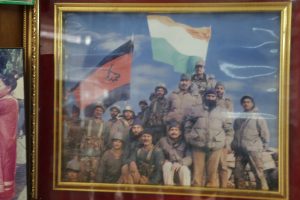 During his time at camp, Clifford’s brother revealed that he often played the mouth organ. He and his friends would play music to entertain themselves.
During his time at camp, Clifford’s brother revealed that he often played the mouth organ. He and his friends would play music to entertain themselves.
Kargil War
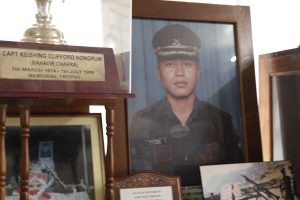 Clifford was deployed at the 12th Battalion Light Infantry on June 30th, 1999, with the objective of capturing the strategically important point 4812 in the Balatik Sector. Assigned as the leader of the assault team, Captain Nongrum embarked on his critical mission, guiding his troops towards the feature from the South Eastern direction. Despite facing a near impossible vertical cliff, Capt Nongrum utilised his field craft skills to lead his column steadily towards the enemy shelters at the top. Upon reaching the summit, they encountered fierce resistance from the well-entrenched enemy forces, positioned in interconnected strongholds carved out of boulders, making them impervious even to artillery fire.
Clifford was deployed at the 12th Battalion Light Infantry on June 30th, 1999, with the objective of capturing the strategically important point 4812 in the Balatik Sector. Assigned as the leader of the assault team, Captain Nongrum embarked on his critical mission, guiding his troops towards the feature from the South Eastern direction. Despite facing a near impossible vertical cliff, Capt Nongrum utilised his field craft skills to lead his column steadily towards the enemy shelters at the top. Upon reaching the summit, they encountered fierce resistance from the well-entrenched enemy forces, positioned in interconnected strongholds carved out of boulders, making them impervious even to artillery fire.
The column of Capt Nongrum was subjected to intense automatic fire from the enemy, effectively immobilising them for a duration of approximately two hours. Recognising that the enemy had established fortified positions, Capt Nongrum understood that a bold and daring move was necessary in order to overpower them and advance towards their objective. Without wasting any time in assessing the gravity of the situation, Capt Nongrum fearlessly charged through the zone of fire, displaying complete disregard for his own safety.
As he closed in on the first enemy position, he swiftly threw grenades, resulting in the elimination of six enemy soldiers. Subsequently, he attempted to seize the enemy’s universal machine gun from the second position, but was met with a barrage of bullets. The audacious actions of Capt Nongrum not only astonished the enemy, but also provided his troops with crucial time to approach and ultimately clear the position.
Despite sustaining severe injuries, he adamantly refused to be evacuated and valiantly fought until he eventually succumbed to his wounds. This courageous act by Capt Nongrum ultimately paved the way for the successful capture of Point 4812.
Clifford usually stayed in touch through the telephone, although there were other means such as postcards and letters. However, as told by the family, they’d typically reach out to him via telephone.
Clifford’s last phone call was made through satellite calling, as the army was instructed to contact them on June 26, 1999, at 11:15 pm.
He informed his mother Saily Nongrum, “We have been given a break, but unfortunately, all my comrades lost their lives during this war.” He also requested his mother to speak slowly due to his ear pain.
During Clifford’s last conversation with Paul, he mentioned, “This war now resembles those in movies like ‘Platoon,’ but in reality, it is not fake like in the movies.”
In his final call with his father, Peter, Clifford expressed, “It appears that we will not be deployed to war again, and we are expected to return in July for a transfer.” He assured that he would return in July, and a letter arrived after his funeral.
Upon Clifford’s demise, Colonel V. S Bhalotia, the General Commanding Officer, made a visit to Shillong to personally inform Clifford’s father, Peter, about the tragic news. At the time, Peter was employed at a bank. Peter pondered the purpose of Colonel Bhalotia’s visit, speculating that it might be related to Clifford’s military achievements. Eventually, the GOC summoned Peter and conveyed the heartbreaking news of Clifford’s passing. They then returned home together, where they shared the devastating news with the rest of the family.
With the aid of a handwritten lecture, Sandeep successfully delivered Captain Keishing Clifford Nongrum’s speech to the students of St Anthony’s College in 2019.
In honour of his memory, his family established a modest museum within their residence, showcasing his personal belongings.
A couple of years later, his family managed to visit the Balatik Sector, where they commemorated Clifford’s memory by placing a cross and offering prayers.
The Late Captain’s father conceived the idea of creating a small museum within their home to commemorate his son, Captain Keishing Clifford Nongrum.



